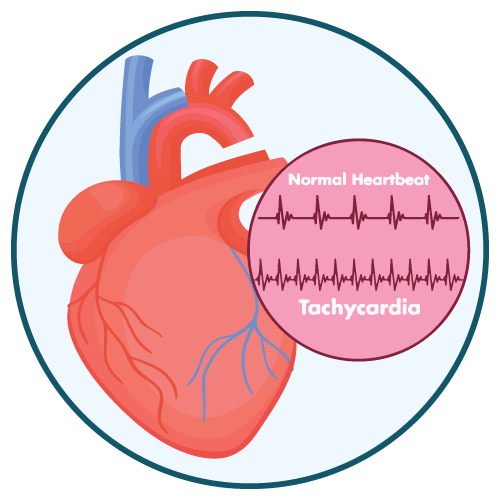| Name | Dextrose + Lidocaine Hydrochloride |
| Classes |
Central Nervous System Agent Anesthetic Anesthetic Combination |
| Diseases |
Anesthesia Spinal Anesthesia |
Dextrose + Lidocaine Hydrochloride
Dextrose + Lidocaine Hydrochloride Injection is a sterile, nonpyrogenic solution containing lidocaine hydrochloride and dextrose in water for injection. Lidocaine hydrochloride is a local anesthetic and antiarrhythmic agent that exerts its effect by increasing the electrical stimulation threshold of the ventricle during diastole. In therapeutic doses, it produces no change in myocardial contractility, in systemic arterial pressure, or in absolute refractory period.
The primary purpose of administering lidocaine hydrochloride intravenously is to manage acute ventricular arrhythmias that occur during cardiac manipulations, such as cardiac surgery. It is also used to treat life-threatening ventricular arrhythmias that occur during acute myocardial infarction.
- Therapy of ventricular arrhythmias is often initiated with a single IV bolus of 1.0 to 1.5 mg/kg at a rate of 25 to 50 mg/min. of lidocaine hydrochloride injection. Following acute treatment by bolus in patients in whom arrhythmias tend to recur and who are incapable of receiving oral antiarrhythmic agents, intravenous infusion of Lidocaine Hydrochloride and 5% Dextrose Injection, USP is administered continuously at the rate of 1 to 4 mg/min (0.020 to 0.050 mg/kg/min in the average 70 kg adult). The 0.4% solution (4 mg/mL) can be given at a rate of 15 to 60 mL/hr (0.25 to 1 mL/min). The 0.8% solution (8 mg/mL) can be given at a rate of 7.5 to 30 mL/hr (0.12 to 0.5 mL/min). Precise dosage regimen is determined by patient characteristics and response.
- When administering lidocaine hydrochloride by continuous infusion, it is advisable to closely monitor the infusion rate. Administer Lidocaine Hydrochloride and 5% Dextrose Injection, USP only with a calibrated infusion device.
- Pediatric: Clinical studies to establish pediatric dosing schedules have not been conducted. The usual dosage is a bolus dose of 1 mg/kg followed by an infusion rate of 20 mcg to 50 mcg/kg/min. The bolus dose should be repeated if infusion is not initiated within 15 minutes of the initial bolus dose.
The most common adverse reactions associated with Dextrose + Lidocaine Hydrochloride Injection include hypotension, unconsciousness, blurred vision, bradycardia, and respiratory depression. Other adverse reactions that may occur include nausea, vomiting, dizziness, confusion, tremors, seizures, and cardiac arrest.
- Constant monitoring with an electrocardiograph is essential to the administration of lidocaine hydrochloride intravenously. Signs of excessive depression of cardiac conductivity, such as prolongation of the PR interval, widening of the QRS interval and the appearance or aggravation of arrhythmias, should be followed by prompt cessation of the intravenous infusion of this agent. It is mandatory to have emergency resuscitative equipment and drugs immediately available to manage adverse reactions involving cardiovascular, respiratory, or central nervous systems. Central nervous system adverse reactions are associated with venous plasma levels above 6.0 μg free base per mL.
- Dextrose + Lidocaine Hydrochloride Injection should be used with caution in patients with heart block, heart failure, or other cardiac conduction abnormalities.
- The use of Dextrose + Lidocaine Hydrochloride Injection in patients with hepatic or renal dysfunction should be carefully monitored.
- Dextrose + Lidocaine Hydrochloride Injection should be administered only by experienced personnel who are trained in the management of cardiac arrhythmias and have access to emergency equipment.
- Patients should be carefully monitored during and after administration of Dextrose + Lidocaine Hydrochloride Injection for any signs of adverse reactions or toxicity.
- The use of Dextrose + Lidocaine Hydrochloride Injection during pregnancy should be carefully considered, and the potential benefits should be weighed against the potential risks to the fetus.
- If malignant hyperthermia develops, discontinue administration immediately and institute therapeutic countermeasures as clinically indicated.
- Lidocaine hydrochloride should not be added to blood transfusion assemblies because of the possibilities of pseudoagglutination or hemolysis.
Contraindication
Lidocaine hydrochloride is contraindicated in patients with a history of hypersensitivity to local anesthetics of the amide type such as-
None known.
Lidocaine is contraindicated in patients with-
- Stokes-Adams syndrome
- Wolff-ParkinsonWhite syndrome
- severe degrees of sinoatrial, atrioventricular, or intraventricular block
 Bangla
Bangla English
English





